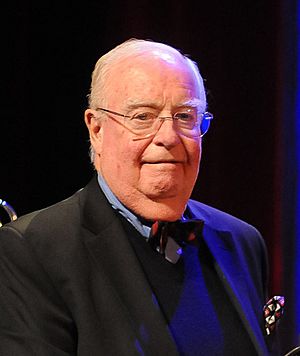Bill Torrey facts for kids
Quick facts for kids
Bill Torrey
|
|
|---|---|

Torrey in 2015
|
|
| Born | June 23, 1934 |
| Died | May 2, 2018 (aged 83) West Palm Beach, Florida, U.S.
|
| Occupation | Hockey executive |
| Known for | General manager of the New York Islanders (1972–92) President of the Florida Panthers (1993–2001) |
| Awards | Hockey Hall of Fame (1995) |
William Arthur Torrey (born June 23, 1934 – died May 2, 2018) was a Canadian leader in ice hockey. He worked as a general manager for several teams in the National Hockey League (NHL). These teams included the Oakland Seals, New York Islanders, and Florida Panthers.
He helped the Islanders become a super team, winning four Stanley Cups in a row! People often called him "The Architect" because he built great teams. He was also known as "Bow Tie Bill" because he always wore a bow tie.
Contents
Bill Torrey's Early Life
Bill Torrey grew up in Montreal, Canada, very close to the Montreal Forum. This was a famous hockey arena. His dad worked as a stockbroker. Bill tried out for the Montreal Canadiens hockey team. He also went to St. Lawrence University on a hockey scholarship.
During a game, he was hit in the eye with a hockey stick. This broke a bone near his eye and made him lose his depth perception. Bill studied psychology in college and also took business classes. After college, he worked at a radio station in Barrie, Ontario. He also worked as a tour guide at Rockefeller Center for NBC.
Hockey Career Highlights
Starting with the Oakland Seals
In the mid-1960s, Bill Torrey started working for the Pittsburgh Hornets. This team was in the American Hockey League. He helped set up fun events to promote the team.
In 1969, he became the general manager of the Oakland Seals. This was a brand new team in the NHL. In 1970, Charlie Finley bought the team. Bill and Charlie often disagreed about how to run the team. Because of this, Bill left the Seals in 1971.
Building the New York Islanders Dynasty
On February 15, 1972, Bill Torrey became the general manager of the new New York Islanders team. He was the very first person hired by the team! Bill decided to build the team by picking young players in the draft. He believed this was the best way to win for a long time.
In 1973, he picked Denis Potvin as the first player in the draft. The general manager of the Montreal Canadiens wanted to trade for Potvin. He offered older, experienced players for the pick. It was a tempting offer for the Islanders, but Bill said no. Potvin grew into one of the best defensemen in the NHL. He later became the team's captain.
For their first two seasons, the Islanders finished last in the league. This gave them high draft picks. Bill used these picks to quickly build a strong team. In the 1977 NHL amateur draft, Bill had to choose between two good forwards: Mike Bossy and Dwight Foster. Bossy was a great scorer but not known for defense. Foster was good at defense but not offense. Coach Al Arbour told Bill to pick Bossy. He thought it was easier to teach a scorer how to play defense. Bossy became an amazing scorer right away. He scored 53 goals in his first season, which was an NHL record for a rookie. Bossy scored 50 goals or more for nine seasons in a row!
In 1979, Bill Torrey became the team president. In 1980, the Islanders were doing well in the regular season but not in the playoffs. Bill made a tough choice. He traded popular players Billy Harris and Dave Lewis to the Los Angeles Kings. In return, he got Butch Goring. This trade helped the team a lot.
Under Bill Torrey's leadership, the Islanders won four Stanley Cups in a row! They won in 1980, 1981, 1982, and 1983. They also won 19 playoff series in a row. Bill picked future Hall of Fame goalie Billy Smith in the team's first draft. He also drafted five other Hall of Fame players: Denis Potvin, Clark Gillies, Bryan Trottier, Mike Bossy, and Pat LaFontaine. He also hired Al Arbour as head coach, who is also in the Hall of Fame.
In 1991, Pat LaFontaine wanted to be traded. Bill Torrey started rebuilding the team. He traded LaFontaine and other players to the Buffalo Sabres. In return, he got Pierre Turgeon, Benoît Hogue, Uwe Krupp, and Dave McLlwain. He also traded captain Brent Sutter to the Chicago Blackhawks. After the Islanders missed the playoffs in 1992, Bill Torrey left the team.
Leading the Florida Panthers
In 1993, Bill Torrey became the president of the Florida Panthers. This was another new NHL team. Bill built this team much like he did the Islanders. He found young, talented players like Rob Niedermayer, Ed Jovanovski, Radek Dvořák, and Rhett Warrener. The Panthers made it to the 1996 Stanley Cup Finals. The team reached the playoffs two more times before Bill retired in 2001. He stayed with the team as a special advisor.
Honors and Awards
Bill Torrey was chosen for the Hockey Hall of Fame in 1995. A special banner hangs in the Barclays Center to honor him. It says "The Architect" and shows a bow tie. This banner is next to banners for Al Arbour and six players Bill drafted.
On October 23, 2010, the Florida Panthers honored Bill Torrey. They retired the number 93 and raised a banner for him. The number 93 stands for the year (1993) when the Panthers team joined the NHL.
Personal Life
Bill Torrey had four sons and ten grandchildren. He passed away at his home in West Palm Beach, Florida, on May 2, 2018.
See also
 In Spanish: Bill Torrey para niños
In Spanish: Bill Torrey para niños

